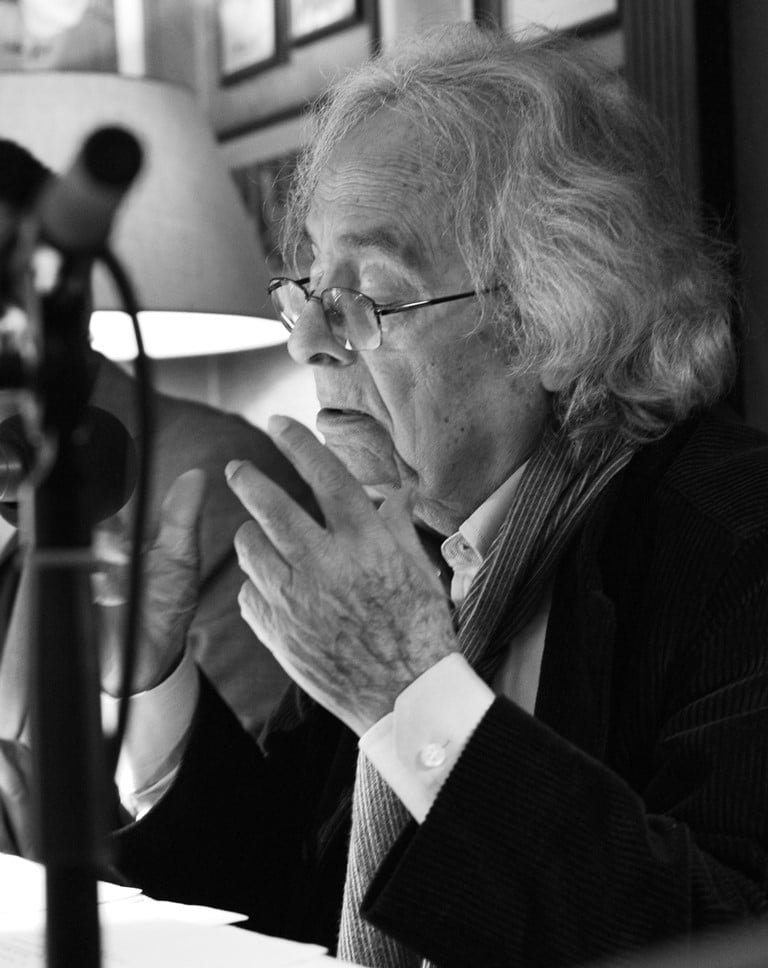
Adonis
- France, Syria
- Zu Gast beim ilb: 2016
After receiving an undergraduate degree at Damascus University, he was imprisoned for six months for his membership in the Syrian Socialist Nationalist Party. He and his wife subsequently chose to flee Syria for Lebanon, where in 1957 he, Yūsuf al-Khāl and other renowned authors began publishing the avant-garde literary journal, »Schi’r« (tr: Poetry). Beginning in 1973, despite the burgeoning civil war, he taught at Lebanese universities before moving to Paris, where he still lives today.
Ali Ahmad Said Esber has published poetry under the pen name Adonis, ever since a poem he submitted with his actual name was rejected by a journal, but then accepted after resubmission under the pseudonym. In 1998 a collection of poetry »Die Gesänge Mihâyrs des Damaszeners« (tr: Songs of Mihâyr the Damascan), from the years 1958 to 1965, was also published in German. In 2004 he followed with a volume titled »Ein Grab für New York« (tr: A Grave for New York), containing poems written from 1965 to 1971. A critic from the »Frankfurter Rundschau« remarked that the latter exposes Adonis’ ambivalence between Western rationalism and a tradition that believes in the shaping of oneself and the world through poetry; as a result, according to the »Süddeutsche Zeitung«, the poet has developed an »independent Arab modernism without mimicry of the West.« Adonis’ free verse breaks from the high Arabic form of poetry while preserving its use of metaphor. When not writing poems, the author also addresses Arabic poetry in essays, including those in his German compilation, »Wortgesang« (2012;tr: Wordsong). In these essays he cites progressive poets such as Bascha Ibn Burd (d. 784) and Abu Tammam (d. 845), for whom the Koran was not only a religious work, but also a source of powerful poetic language that presents a literary challenge to offer openness in juxtaposition to the book’s allegedly static truths. Adonis feels that these poets can provide direction for today’s Arab world (»Neue Zürcher Zeitung«). In his three-volume epic »Al-Kitab« (2007–2015; tr: The Book), the poet ventures on a literary journey through the 9th century, which he considers the most important epoch in Arab history, with guidance from Al-Mutanabbi, another politically engaged poet from this time. In 2014 Adonis published »Der Wald der Liebe in uns« (tr: The Forest of Love within the US), a volume of love poetry translated from French into German, as the Arabic original has been lost. In this recent work he grapples instead with the more political and religious revolts of the body, which for him is laden with mystical symbolism.
Adonis has received multiples distinctions, including the 2001 Goethe Medal, the 2013 Petrarch Prize and the 2016 Erich Maria Remarque Peace Prize awarded by the city of Osnabrück.
Die Gesänge Mihâyrs des Damaszeners
Gedichte 1958–1965
Ammann
Zürich, 1998
[Ü/Hg: Stefan Weidner]
Ein Grab für New York
Gedichte 1965–1971
Ammann
Zürich, 2004
[Ü/Hg: Stefan Weidner]
Wortgesang
Von der Dichtung zur Revolution
[Hg: Stefan Weidner]
S. Fischer
Frankfurt a. M., 2012
[Ü: Rafael Sanchez]
Der Wald der Liebe in uns
Jung und Jung
Salzburg, 2013
[Ü: Ingeborg Waldinger]
Jérusalem
Mercure de France
Paris, 2016
[Ü: Aymen Hacen]
